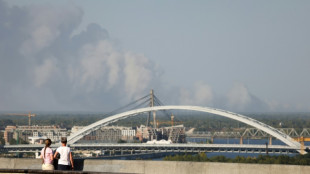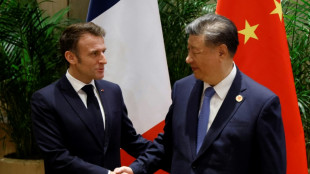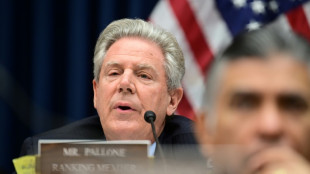
-
 Trump ally seeks to block trans lawmaker from women's restrooms
Trump ally seeks to block trans lawmaker from women's restrooms
-
Slovakia oust Britain to meet Italy in BJK Cup title match

-
 Top-selling daily French daily Ouest-France stops posting on X
Top-selling daily French daily Ouest-France stops posting on X
-
Russian invasion toll on environment $71 billion, Ukraine says

-
 'Sabotage' suspected after two Baltic Sea cables cut
'Sabotage' suspected after two Baltic Sea cables cut
-
'You will die in lies!': daughter clashes with father at French rape trial

-
 Spain Women drop veterans Paredes and World Cup kiss victim Hermoso
Spain Women drop veterans Paredes and World Cup kiss victim Hermoso
-
Stocks diverge on fears of Ukraine-Russia escalation

-
 New Botswana leader eyes cannabis, sunshine to lift economy
New Botswana leader eyes cannabis, sunshine to lift economy
-
'Operation Night Watch': Rembrandt classic gets makeover

-
 Haiti police, civilians kill 28 gang members: authorities
Haiti police, civilians kill 28 gang members: authorities
-
Taxing the richest: what the G20 decided

-
 'Minecraft' to come to life in UK and US under theme park deal
'Minecraft' to come to life in UK and US under theme park deal
-
IMF, Ukraine, reach agreement on $1.1 bn loan disbursement

-
 Japan on cusp of World Cup as Son scores in Palestine draw
Japan on cusp of World Cup as Son scores in Palestine draw
-
Chelsea condemn 'hateful' homophobic abuse towards Kerr, Mewis

-
 Hamilton to race final three grands prix of Mercedes career
Hamilton to race final three grands prix of Mercedes career
-
Gatland has not become a 'bad coach' says Springboks' Erasmus

-
 Slovakia take Britain to doubles decider in BJK Cup semis
Slovakia take Britain to doubles decider in BJK Cup semis
-
Brazil arrests soldiers over alleged 2022 Lula assassination plot

-
 Ukraine war and climate stalemate loom over G20 summit
Ukraine war and climate stalemate loom over G20 summit
-
Ukraine fires first US long-range missiles into Russia

-
 Retiring Nadal to play singles for Spain against Netherlands in Davis Cup
Retiring Nadal to play singles for Spain against Netherlands in Davis Cup
-
Rain ruins Sri Lanka's final ODI against New Zealand

-
 Stocks sink on fears of Ukraine-Russia escalation
Stocks sink on fears of Ukraine-Russia escalation
-
Hendrikse brothers start for South Africa against Wales

-
 Macron tells Xi he shares desire for 'durable peace' in Ukraine
Macron tells Xi he shares desire for 'durable peace' in Ukraine
-
Ruthless Japan beat China to move to brink of World Cup qualification

-
 French farmers threaten 'chaos' over proposed EU-Mercosur deal
French farmers threaten 'chaos' over proposed EU-Mercosur deal
-
Brazil arrests G20 guards over alleged 2022 Lula assassination plot

-
 China's Xi urges 'strategic' ties in talks with Germany's Scholz
China's Xi urges 'strategic' ties in talks with Germany's Scholz
-
Raducanu gives Britain lead on Slovakia in BJK Cup semis

-
 Russia says Ukraine fired first US-long range missiles
Russia says Ukraine fired first US-long range missiles
-
COP29 negotiators strive for deal after G20 'marching orders'

-
 Walmart lifts full-year forecast after strong Q3
Walmart lifts full-year forecast after strong Q3
-
British farmers protest in London over inheritance tax change

-
 NATO holds large Arctic exercises in Russia's backyard
NATO holds large Arctic exercises in Russia's backyard
-
Trouble brews in India's Manipur state

-
 Son of Norwegian princess arrested on suspicion of rape
Son of Norwegian princess arrested on suspicion of rape
-
Romanian court says 'irregularities' in influencer Andrew Tate's indictment

-
 Iran faces fresh censure over lack of cooperation at UN nuclear meeting
Iran faces fresh censure over lack of cooperation at UN nuclear meeting
-
Despondency and defiance as 45 Hong Kong campaigners jailed

-
 Scholar, lawmakers and journalist among Hong Kongers jailed
Scholar, lawmakers and journalist among Hong Kongers jailed
-
European stocks slide on fears of Russia-Ukraine escalation

-
 Police break up Georgia vote protest as president mounts court challenge
Police break up Georgia vote protest as president mounts court challenge
-
Spain royals visit flood epicentre after chaotic trip

-
 France's Gisele Pelicot says 'macho' society must change attitude on rape
France's Gisele Pelicot says 'macho' society must change attitude on rape
-
G20 leaders talk climate, wars -- and brace for Trump's return

-
 US lawmaker accuses Azerbaijan in near 'assault' at COP29
US lawmaker accuses Azerbaijan in near 'assault' at COP29
-
Tuchel's England have 'tools' to win World Cup, says Carsley

| RBGPF | -0.74% | 59.75 | $ | |
| RYCEF | -2.24% | 6.7 | $ | |
| CMSC | -0.06% | 24.61 | $ | |
| GSK | -0.64% | 33.475 | $ | |
| RIO | 0.08% | 62.17 | $ | |
| NGG | 1.02% | 63.545 | $ | |
| CMSD | -0.08% | 24.37 | $ | |
| RELX | 0.41% | 45.225 | $ | |
| BTI | 0.52% | 36.87 | $ | |
| SCS | -0.88% | 13.085 | $ | |
| BCC | -2.55% | 138.025 | $ | |
| VOD | -0.56% | 8.87 | $ | |
| AZN | 0.76% | 63.875 | $ | |
| BP | -1.43% | 29.005 | $ | |
| BCE | 0.46% | 27.355 | $ | |
| JRI | -0.08% | 13.22 | $ |

Swiss Cold War bunkers back in vogue as Ukraine conflict rages
Russia's invasion of Ukraine has reawakened interest in Switzerland's concrete nuclear fallout shelters, built during the Cold War with enough space to shelter everyone in the country.
Since the 1960s, every Swiss municipality has had to build nuclear bunkers for their residents, while such shelters have also been mandatory in all homes and residential buildings over a certain size built since then.
The shelters have become an integral part of the Swiss identity, on a par with the country's famous chocolate, banks and watches.
But the underground spaces, long seen as a quirky curiosity mostly used for storage or as very well-protected wine cellars, are being viewed in a new light since Russia invaded Ukraine on February 24.
Just days into the attack, Russian President Vladimir Putin put the country's strategic nuclear forces on high alert, sparking global alarm.
Fierce fighting near Ukraine's nuclear power plants, including Chernobyl -- the sight of the world's worst nuclear accident in 1986 -- have also heightened fears that even traditionally neutral Switzerland could be affected by the war.
- 'Ukraine is very nearby' -
"People are discovering that Ukraine is very nearby," Marie Claude Noth-Ecoeur, who heads civil and military security services in the mountainous southern Wallis region, told AFP.
The wealthy Alpine country has pledged that each and every resident will have a shelter space if needed.
In fact, the country of 8.6 million people counts nearly nine million spaces across 365,000 private and public shelters.
But while there are more than enough spots at a national level, there are vast regional differences.
Geneva is worst off, with only enough places for 75 percent of its population.
Nicola Squillaci, head of Geneva's civil protection and military affairs division, said the shelters were conceived to provide protection "especially in the case of a bombing and a nuclear attack".
They would help protect the population "against the shock waves, and against radioactivity in the air", he told AFP.
Ducking into a private shelter for around 150 people, underneath a brand new residential building in the Geneva suburb of Meyrin, Squillaci pointed out how, in peace time, it was equipped with basement storage units for the apartment dwellers above.
But unlike most storage facilities, this one comes with composting toilets, kits for quickly assembling beds, and a ventilation system that filters the air coming in from the outside.
- 'Capsule' -
"It is like a capsule, with airlocks on emergency exits and main exits," Squillaci said.
"If the building were to collapse, the shelter would remain intact."
Switzerland's vast network of nuclear bunkers have a range of other day-to-day uses, including as military barracks or as temporary accommodation for asylum seekers.
But Swiss authorities require that they can be emptied and reverted back to nuclear shelters within five days.
So far, Switzerland's population has never been ordered down into the shelters, not even in the wake of the Chernobyl disaster.
Experts say the most likely scenario for needing to use them has always been a possible accident at one of Switzerland's own nuclear power plants.
But now the conflict raging in Ukraine has added a new, urgent layer to the national nuclear anxiety.
With public concern growing, Swiss authorities have published overviews of the available shelter spots, and have urged households to always maintain a stock of food to last at least a week.
With Ukraine, "the geopolitical situation has altered the paradigms a bit," Squillaci said, adding that authorities were receiving "enormous numbers of legitimate questions from citizens."
A number of property owners who previously sought to pay a fine rather than build bunkers were also backtracking, he said.
- 'Temporary protection' -
To compensate for the lack of shelters under chalets and other traditional mountain homes, Alpine cantons like Wallis meanwhile rely heavily on large collective bunkers.
In Evionnaz, a municipality with around 1,000 inhabitants, the collective shelter can accommodate around 700 people, counting 15 dormitories filled with row after row of three-storey bunk beds.
"The country asks us to be on the ready," Noth-Ecoeur said.
"Today we are in a preparatory phase, and we are ready to put the shelters to use."
Experts caution though that the level of protection provided by the shelters in the case of actual nuclear weapons use would depend heavily on the intensity and proximity of the strikes.
"The shelters could offer the population a certain level of temporary protection against radioactive events," Swiss defence ministry spokesman Andreas Bucher told AFP.
"A large-scale nuclear war would however be catastrophic, and no state would be able to guard against the effects."
B.Torres--AT
